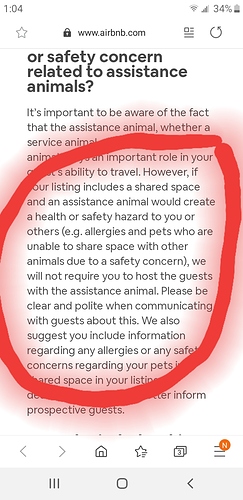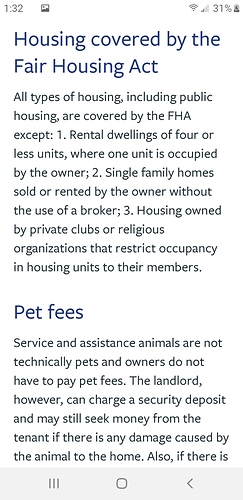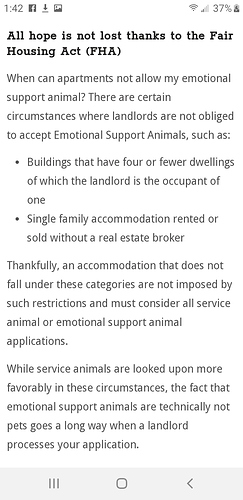Yup. I think I’ve heard it all now. Several times… From the other side of the pond, with thanks.
Whoops. Just found this;-
Dang…that pig isn’t even cute. … 
(Am I the only one to think an emotional support animal should be cute?..Don’t answer.)
This. LOL
It does count on Airlines flying to/from the US, and hotels affiliated with US chains…Hilton/Mariott/ Starwood, etc. However, let me tell you the strange looks I get flying with my ESA within Europe en route to/from the US. People here have zero idea what an ESA is and just chalk it up to crazy Americans.
I’m still a little confused even after reading many replies. Yesterday, we had a woman do instant booking and tell us that she had a service dog. On our Airbnb description we specify that our home is not suitable for pets. This is a shared home with a private bedroom for guests. We have two cats who are terrified of dogs. I replied that for these reasons we couldn’t accommodate her. Then I called Airbnb just to check and they said They would find her another Airbnb. However, they said that they consider this action of hours to be discriminatory. I asked if it would affect our super host status and they did not reply. In the future, am I required to have a service animal here and our cats will just have to put up with it? What if someone had a severe allergy? I know I’m being paranoid but I hope we don’t get sued…
Having two cats in your home is sufficient enough reason for denying guests with pets~ though a reason is not even necessary except for Air’s purposes.
If you want to deter anyone traveling with animals from booking your place, it would be a lot easier if you specified that reason prominently in your listing. Stating that your home is “not suitable” leaves it open to interpretation (and challenge) by the traveler. I would suggest using a stronger phrase, “unable to accept”.
Air states that hosts may decline to rent to guests with pets, or who smoke or are greater than the number allowed in the accommodation because these factors are not prohibited by law. Service animals are protected by law.
The ADA says that businesses serving the public generally must allow service animals to accompany people with disabilities in all areas of the facility where the public is normally allowed to go. However, your home is not a public facility and your bias is not unlawful.
I just glanced through the Air attachment from K9KarmaCasa and found this which is right on point:
“…if your listing includes a shared space and an assistance animal would create a health or safety hazard to you or others (e.g. allergies and pets who are unable to share space with other animals due to a safety concern), we will not require you to host the guests with the assistance animal.”
I’ve gotten some really useful responses and I’ve spent some time reading over the Airbnb rules and regs as well. Since my two lovable kitties would go nuts if a dog into the house, I’m going to make my wording much clearer on our homepage. I’m lucky to live in a city where there are 280 Airbnbs so that potential guests with service dogs will have many alternatives. If and when we have no cats, we will gladly change our policy because I feel that people with disabilities have a right to choose whatever housing they like. Thanks again for all the comments, Rachael
This helps a lot, @SandyToes. I have a dog who loves people but would likely not want to share space with other animals (in fact, her breed characteristics say American Bulldogs may be dog aggressive and I can attest she’d definitively give a visiting cat a good run around the house.) I was wondering whose liability it would be if Air forced us, by threat of “discrimination” to accept animals. I’m going to have to update my listing as to why we’re not suitable for guest animals.
Good topic.
I am worried now, after reading through Airbnb’s anti-discrimination rules.
As mentioned here before “emotional support animals” aren’t really a thing outside the US, but now I’m really concerned that American guests might turn up with an undeclared pet.
Over the years we’ve had several potential guests checking to make sure there had never been any cats in the house because of their severe allergies. Luckily there was only one request to bring a support animal.
We rent out the whole place, but I still don’t want to ever host anyone with a pet / assistance animal. I would have to reconsider hosting on Airbnb if I was forced to accept something that isn’t even law in our country.
OK first off I’m a service dog handler myself there’s no such thing as certification or registries for service animals. I can back up my statement by providing links straight from the ADA. Secondly the fair housing act doesn’t apply here you’re providing a public service accommodation therefore you have to follow by the Americans With Disabilities Act. Under this act a service dog handler is not required to show any proof that their animal is a service animal because there is no such thing. So if this is in fact a real service dog handler they shouldn’t have even asked because it is their right to have their medical equipment with them. Most legit handlers know this. Also service animals can be of any breed or size which the Americans with disabilities act also states. Their are service dogs for diabetes autism bipolar depression PTSD seizures mobility issues etc.
Yes that’s not reason enough to deny a service animal. You’d have to remove the cats or find the person a different air bnb
There’s no papers for service animals read the ada those can be bought by anyone
Actually… this is not entirely accurate. If I have an STR in My home… I can ABSOLUTELY AND LEGALLY deny any service animal. It would be different if it was a whole house listing.
Actually no you can’t,your providing a public accommodation. Want my lawyer to contact you personally to speak to about this? Otherwise read the law and don’t argue or read the law and not understand it but I’m not dealing with people who can’t understand the law that’s clear as day.
It is not only clear but it is also part of the Airbnb terms of service as I have not only linked but screenshot for you above
Caitlin, if you are an attorney, I am interested as to whether your interpretation is that all Airbnbs in USA must be compliant with the Americans with Disabilities Act? Accessible toilets, etc.? My understanding is that the public accommodation definition is a legal grey area and that size, owner presence and type of operation have impacted court interpretations.
For example, I advertise as wheelchair accessible, but I don’t make claims as to ADA. Some of my suite is compliant (doorway width, no thresholds including shower, proper bed and toilet height, grab bars). However, my ramp is slightly steeper than one inch rise to one foot run, and my accessible height sink would need to be moved 6 inches to the right (further away from a wall) to be ADA compliant. I can’t imagine how much it would cost every host to reconfigure their properties to those standards.
According to a Fortune article I consulted: “The Americans With Disabilities Act (ADA) is not likely to apply to renting out space in a private home or apartment. The ADA is likely to apply to large apartment buildings. The law has an exemption for owner-occupied lodgings with five rooms or fewer.”
This is apart from Airbnb requirements, which do not have the force of law, but are contractual. In particular, one of my two dogs will not tolerate a strange dog in the shared backyard; there would be a dog fight with likely injuries. This has yet to come up in the context of a service animal, but if someone complained about it, and if Air de-listed me, I have other STR platform options.
Disability
-
Airbnb hosts may not:
- Decline a guest based on any actual or perceived disability.
- Impose any different terms or conditions based on the fact that the guest has a disability.
- Substitute their own judgment about whether a unit meets the needs of a guest with a disability for that of the prospective guest.
- Inquire about the existence or severity of a guest’s disability, or the means used to accommodate any disability. If, however, a potential guest raises his or her disability, a host may, and should, discuss with the potential guest whether the listing meets the potential guest’s needs.
- Prohibit or limit the use of mobility devices.
- Charge more in rent or other fees for guests with disabilities, including pet fees when the guest has an assistance animal (such as a service or emotional support animal) because of the disability.
- Post any listing or make any statement that discourages or indicates a preference for or against any guest on account of the fact that the guest has a disability.
- Refuse to communicate with guests through accessible means that are available, including relay operators (for people with hearing impairments) and e-mail (for people with vision impairments using screen readers).
- Refuse to provide reasonable accommodations, including flexibility when guests with disabilities request modest changes in your house rules, such as bringing an assistance animal that is necessary because of the disability, or using an available parking space near the unit. When a guest requests such an accommodation, the host and the guest should engage in a dialogue to explore mutually agreeable ways to ensure the unit meets the guest’s needs.
-
Airbnb hosts may:
- Provide factually accurate information about the unit’s accessibility features (or lack of them), allowing for guests with disabilities to assess for themselves whether the unit is appropriate to their individual needs.
Personal Preferences
- Provide factually accurate information about the unit’s accessibility features (or lack of them), allowing for guests with disabilities to assess for themselves whether the unit is appropriate to their individual needs.
-
Airbnb hosts may
- Except as noted above, Airbnb hosts may decline to rent based on factors that are not prohibited by law. For example, except where prohibited by law, Airbnb hosts may decline to rent guests with pets, or to guests who smoke.
- Require guests to respect restrictions on foods consumed in the listing (e.g., a host who maintains a Kosher or vegetarian kitchen may require guests to respect those restrictions). These restrictions should be stated clearly in your house rules.
- Nothing in this policy prevents a host from turning down a guest on the basis of a characteristic that is not protected under the civil rights laws or closely associated with a protected class. For example, an Airbnb host may turn down a guest who wants to smoke in a unit, or place limits on the number of guests in a unit.
Nothing in your post comment has anything to do with what I am speaking of. If you are an owner-occupied building with less than four units you are absolutely allowed to deny any and all animals. I have already posted and screenshot Airbnb and the Ada terminology on this. And here’s another one for you



